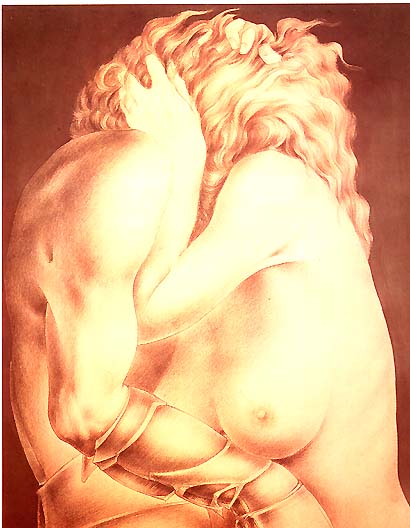 Two elements make this from the start an refreshing enterprise. One is the parallels that are being made with the current situation of Israel and the Palestinians. However the positions are reversed; the Israelis rule and the Palestinians are the subdued. The other is that Samson is taken for the uneasy figure he is. He is an unusual kind of hero in Judaism with his physical prowess and his sexual escapades with enemy women. Deeper than that, he is a man with a troubled, torn psyche; uneasy with his holy task, confused about his identity and hopelessly failing in his relations.
Two elements make this from the start an refreshing enterprise. One is the parallels that are being made with the current situation of Israel and the Palestinians. However the positions are reversed; the Israelis rule and the Palestinians are the subdued. The other is that Samson is taken for the uneasy figure he is. He is an unusual kind of hero in Judaism with his physical prowess and his sexual escapades with enemy women. Deeper than that, he is a man with a troubled, torn psyche; uneasy with his holy task, confused about his identity and hopelessly failing in his relations.Lecturer Eli Ungarn, reveals he is inspired by David Grossman's interpretation of Samson, but to my taste, he doesn't completely succeed in supporting, or even explaining Grossman's characterization of Samson as an artist. What struck me more than that, was how Samson seemingly rebels against his task. He tries to connect with, and become part of the Philistines, but even in his rebellion, he fumbles and achieves nothing but the opposite. The story emphasizes, how this was all part and parcel of God's plan from the start. And so, even more, Samson in spite of all his might (he also turns out to be quite smart) is a human disaster from the git go.
7 comments:
Just finished listening to the first lecture: very very interesting (although all the interruptions from the people lucky enough to have been present there get kinda annoying after a while)
Already looking forward to having the time for the 2nd lecture!
BTW, Anne: How do you keep up with YOURSELF in g'dsnaam? Already too much to listen to in two days, and (not having followed your blog for a while) scared to look in the archive for finding all kinds of stuff I really also have to download.....
Hey Micheal, I missed you! Welcome back.
I had high expectations after the first lecture as well. Not all of that came true. Still a very commendable podcast.
How do I keep up? Well, I must admit having too much of a good time listening to podcasts and writing about them. But also that I have been posting less of late. I used to come close to 2 posts a day. Now I do 1.5 - at best.
Couldn't resist and just finished the complete series.
Refreshing to hear the Shimshon-story close-read from a literary and a non-rabbinical, but still very Jewish angle.
An example, again, of the enormous literary depth in the ol' Tanakh. The lecture really gave me some new insights in the story - although I don't think everything Ungar (a/o Grossman) says is historically plausible.
Maybe your problem with the lectures is also the historical aspect / anachronisms in literary approach?
I have no problem with a literary approach, quite to the contrary. I just felt a couple of points could have been elaborated a bit more. Ungar doesn't finish all the lines of thought he set out.
That's true.. Do you have an example?
Can't help but linking this story to the disappointing speech by Karen Armstrong you posted...
Religion hurts - the character of Shimshon felt this in a deep and complex way AND the geniuses that wrote the story ages ago knew and understood this.
What a treasurebox this Tanakh.
Are you referring to the TED talk? Or the appearance on Speaking of Faith? I liked the latter much better than the former.
Examples... Hmm, three spring to mind
1- Eli emphasizes how unhappy Shimshon's mom is, that he is going to be 'nationalized'. The very same feelings Shimshon seems to have. It is pointed out, but deserved more emphasis
2- there was much talk about the meaning of names, but Dlilah, was not translated at all. And it could have shed a very literary light on the superficial nature of Shimshon's love life.
3- Manoach is portrayed as a buffoon, but that was never fully justified, neither a being true (I could see him having a sort of streetwise) or as having some function in the story. So, why make such a point of it?
Meant the TED-talk - terrible. I'll have a listen to the SoF episode.
You are right about the undeveloped points, but to me they are not the most interesting aspects because they all involve a bit too much speculation.
An unhappy mother - is that really relevant to Shimshon's struggle with his destiny?
Also Grossman's "umbilical chord"-parallel seems very far fetched to me. We don't need Shimshon's mother to get a feel of his estrangement to everything and everybody around him.
Also wasn't that excited about reflections on Manoach's intelligence. It is interesting to note that he was a Danite - this story is not about proud Warriors from Yehudah; it's all about the periphery, the border, a prelude to bigger things to come.
On the name D'lilah - Dalil, I agree with you. Very strange that Ungar seemed to miss it.
Post a Comment